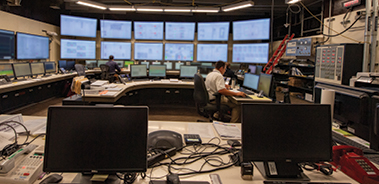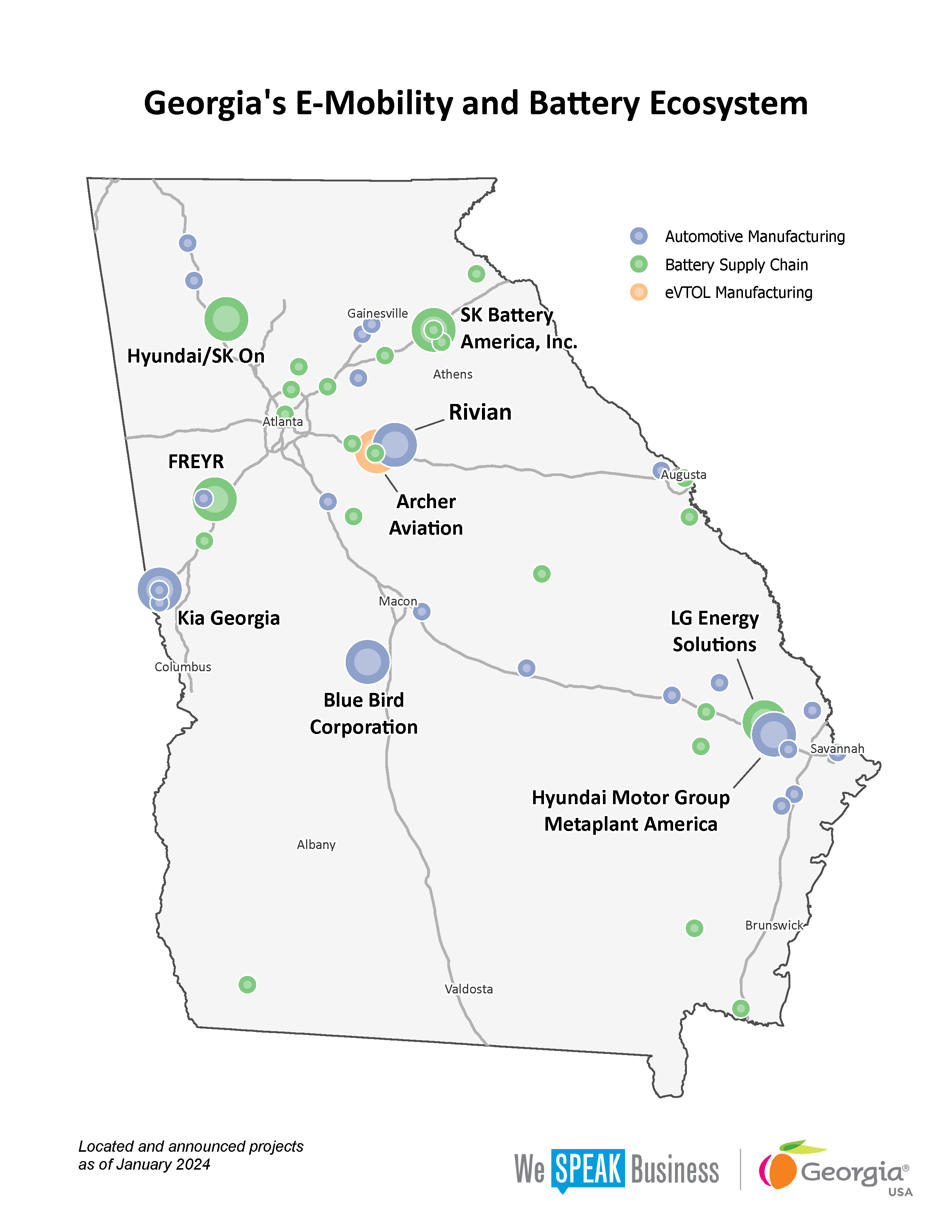Last fall, the small town of Metter, Georgia, scored an atypically large investment — $35 million — from a foreign automotive supplier that’s since broken ground on a manufacturing plant there. It took but five months before Metter inked a second such manufacturing project of generational proportions.
Combined, the two projects — from the South Korean automotive suppliers DAS and Doowon — represent capital expenditures of $65 million and 500 new jobs landing in a town of fewer than 4,000 citizens an hour west of Savannah.
Huge investments in clean energy and electric transportation are coming to lots of Georgia towns with names you’ve never heard. Gov. Brian Kemp has taken to calling Georgia “the e-mobility capital of the world.” There’s not a corner of the state that hasn’t been touched.
Anovion, a maker of EV battery materials, is pumping $800 million into a plant being built in Bainbridge. SK Battery is down for $2.6 billion — and 3,000 jobs — in Commerce. Rivian plans to bring 7,500 jobs to Social Circle. Sewon, another in a veritable parade line of South Korean EV suppliers, is investing $300 million and creating 740 jobs in Rincon. Black Creek, Cartersville, Richmond Hill, Newnan, Dublin, Locust Grove, Toccoa and Kingsland are among the Georgia enclaves taking on EV-related projects that need at least 100 workers.
Qcells Makes Record Commitment
As this promised EV ecosystem continues to fill in with investments now exceeding $23 billion, less noticed but not to be forgotten is Georgia’s massive foothold in solar manufacturing. South Korea’s Qcells, which opened the Western Hemisphere’s largest solar panel facility in Dalton in 2019, now accounts for some 40% of U.S. solar panel capacity at that original site and an adjacent facility. Last year, Qcells announced a $2.5 billion expansion of its Georgia footprint, the largest-ever investment in clean energy manufacturing in the U.S., according to both state and federal officials.
“This news,” said Qcells CEO Justin Lee in a statement, “is further evidence of our growing partnership with Georgia, the workforce there, and an even brighter future together.”
Expanding out of Dalton, Qcells is building a manufacturing facility at a state-certified site in Cartersville, less than an hour northwest of Atlanta on I-75. The Cartersville plant, the company says, will manufacture 3.3 gigawatts annually of solar ingots, wafers, cells and finished panels. In October, Qcells announced the completion of the expansion’s Dalton phase, bringing the full factory’s output to more than 5.1 GW, and, the company said in a statement, “the first solar panel expansion since the passage of the federal Inflation Reduction Act.” As that sprawling federal support fund continues to back clean energy projects across the state, officials of the Kemp administration point out that Qcells put down billion-dollar roots in Georgia long before the IRA.
“Out of all the places Qcells could have gone,” Gov. Kemp said in a statement. “They chose to operate and expand here in Georgia because of our unrivaled assets and the competitive package we put together.”
Hyundai’s Expanding Reach
Without doubt, though, the jewel in Georgia’s clean energy crown is Hyundai’s ahead-of-schedule and already expanding Metaplant America near Savannah, and the fertile jobs ecosystem that has sprung up to supply it. Trip Tollison, president and CEO of the Savannah Economic Development Authority (SEDA), likes to point out that it’s only been two years since Hyundai officials first visited the site in Bryan County (see Site Selection, March 2023), to which they’ve now pledged investments totaling some $7.5 billion. Construction of the plant is moving forward at a ruthless clip.
“When you go out there and see what they’ve accomplished in such a short time, it’s pretty freaking amazing,” Tollison says.
Connected to the Metaplant by the increasingly busy I-16, Metter lies within Hyundai’s expanding radius of suppliers. It’s 45 minutes to the west.
“Looking ahead to future expansion prospects, we deemed Metter to be an ideal location thanks to its close proximity to Metaplant America,” said Sen Kim, CEO of DAS, announcing the company’s $35 million, 300-job project in September. Doowon Climate Control America, announcing its $30 million, 200-job project in February, said it will funnel parts from Metter to both Hyundai and Kia, Georgia’s other big automaker. Farther west still on I-16, South Korea’s Hwashin, another parts maker, announced plans in October for a $176 million manufacturing plant that’s bringing 460 jobs to Dublin. In all, SEDA counts 17 Hyundai suppliers in the process of building out in Georgia.
“If you add up what Hyundai and all its suppliers are doing,” says Tollison, “it is a 15,000-job project with a $10 billion investment.”
New Nuclear in Waynesboro

When Georgia Power’s Vogtle Unit 3 entered commercial operation in July, its inauguration marked the completion of the country’s first newly constructed nuclear unit in more than 30 years. A companion Unit 4, its control room shown here, is expected to power up this spring, with the two reactors projected to produce a combined 2,200 MW of carbon-free electricity, enough to power 1 million homes.
Despite years of delays and significant cost overruns, supporters of the project, including Gov. Brian Kemp, hail the emerging new power source as a central component of Georgia’s efforts to recruit clean energy jobs.
Photo courtesy of Georgia Power

